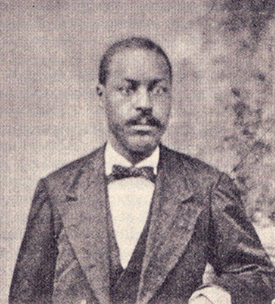Shober, James Francis
23 Aug. 1853–6 Jan. 1889
 James Francis Shober was the first known Black physician with a medical degree to practice in North Carolina. He was born in or near the Moravian town of Salem. He was allegedly the son of Betsy Ann Waugh (1835–59), an eighteen-year-old, multiracial, enslaved woman. Circumstantial evidence suggests that she was the daughter of John H. Schulz, a white resident of the town, and that her son was fathered by twenty-two-year-old Francis Edwin Shober, an 1851 graduate of The University of North Carolina and recently admitted to the bar. Betsy Ann Waugh later married an enslaved man named David Shober (1822–67), who was enslaved by a relative of Francis Edwin Shober.
James Francis Shober was the first known Black physician with a medical degree to practice in North Carolina. He was born in or near the Moravian town of Salem. He was allegedly the son of Betsy Ann Waugh (1835–59), an eighteen-year-old, multiracial, enslaved woman. Circumstantial evidence suggests that she was the daughter of John H. Schulz, a white resident of the town, and that her son was fathered by twenty-two-year-old Francis Edwin Shober, an 1851 graduate of The University of North Carolina and recently admitted to the bar. Betsy Ann Waugh later married an enslaved man named David Shober (1822–67), who was enslaved by a relative of Francis Edwin Shober.
James Francis Shober was graduated from Lincoln University in Oxford, Pa., in 1875 with a grade average of 95.5 and then entered the Howard University School of Medicine in Washington, D.C. One of forty-eight graduates in the class of 1878, he returned to practice in Wilmington, the largest town in North Carolina. His college and medical school expenses are believed to have been paid by members of the Shober family, perhaps by his natural father.
As the sole black physician in a city with 10,504 Black Americans, Dr. Shober undoubtedly was quite busy. He was well-liked and highly respected and served as an elder in the Presbyterian church. On 28 June 1881 he married Anna Maria Taylor, and they became the parents of two daughters, Mary Louise and Emily Lillian. Only thirty-six when he died, he was buried in Pine Forest Cemetery, Wilmington.
References:
Hubert A. Eaton, Every Man Should Try (1984).
Medical Society of New Hanover, Brunswick, and Pender Counties, The Lonely Road: A History of the Physicks and Physicians of the Lower Cape Fear, 1735–1976 (1977?).
Memoirs of Betsy Ann (1859), David Shober (1867) (Moravian Archives, Winston-Salem).
Wilmington Daily Review (7 Jan. 1889), Journal (11 Feb. 1982), Messenger (8 Jan. 1889), and Star-News (14 Feb. 1982).
Additional Resources:
"James Francis Shober 1853-1889." N.C. Highway Historical Marker D-83, N.C. Office of Archives & History. https://www.ncdcr.gov/about/history/division-historical-resources/nc-highway-historical-marker-program/Markers.aspx?MarkerId=D-83 (accessed February 12, 2014).
Mack, Angela. "James Shober paved the way for black physicians." Star-News (Wilmington, N.C.). February 12, 2007. 6. http://news.google.com/newspapers?id=9QtPAAAAIBAJ&sjid=ESAEAAAAIBAJ&pg=2804%2C2968586 (accessed February 12, 2014).
"Gift to Rare Books and Documents Collection." Board of Trustees Meeting, University of North Carolina at Wilmington, October 8, 1980 (minutes). 3-4. https://archive.org/stream/Minutes_Board_of_Trustees-UNCW_1979Apr11-1983Apr27#page/n229/mode/2up (accessed February 12, 2014).
Image Credits:
"James Frances Shober." Photograph. Howard University Medical Department: A Historical, Biographical, and Statistical Souvenir. Freeport, N.Y.: Books for Libraries Press. 1971. (reprint of 1900 edition). 215.
1 January 1994 | Powell, William S.